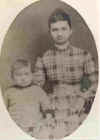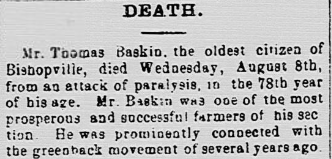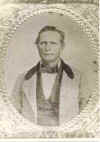Thomas Baskin was born November 1, 1822 in Kershaw (or, according to some records, Lancaster) County, SC. He was the son of James & Elizabeth Wells Baskin .
Thomas was first married in 1842 to Maria F. Peebles. They had two children:
William Peebles Baskin, Sr. (1843-1866)
married Sarah Anne StuckeyJoseph Edward Baskin (1845-1888)
married Angeline Patience Stuckey

1850 Census: Kershaw, Kershaw, SC p. 104, (image 67 of 118)
- Click on the image above to see more of
this page, you'll notice that...
- Thomas' father James and family are three households away.
- There are several other related families: Stewarts, Hortons, and Marshalls.
- I'm still not sure who William Baskin (age
63) and Ann
Marshall (age 45) are.
- Thomas had an older brother named William, but he was born in 1807, and would have been 43 years old in the 1850 census. Furthermore, his brother William died in 1846.
- Thomas had a uncle named William; but he was born in 1772 and died in 1830.
- Ann Marshall is also a mystery. Thomas' grandmother's maiden name was Marshall, as was the wife of his uncle William. However, given her age, I can find no obvious matches.
 1860 Census: Columbia, Richland, SC p.
81 (image 41/45)
1860 Census: Columbia, Richland, SC p.
81 (image 41/45)
In 1860 Thomas and family were living in Colombia. 17-year-old William is missing in this enumeration... perhaps he was away at school. Thomas is working as an overseer and the value of his personal estate is $2000.

1870 Census: Bishopville, Sumter, SC p. 8B (image 16/43)
Like so many, Thomas' family has suffered greatly in the aftermath of the Civil War. The value of Thomas' personal estate was less than a tenth of what it was in 1850. The census enumeration also listed Thomas and Maria as black... which made it a bit harder to find them! 14-year-old Samuel Harding probably is indeed black and a fourteen-year-old laborer on Thomas' farm.
The 1870s were difficult times in South Carolina. A series of inept (if not corrupt) Reconstruction governments took their toll... as did the dismal economy of the period. The local newspapers show that Thomas went bankrupt at least once during this decade. The May 10th, 1871 edition of the Sumter Watchman carries an advertisement indicating: "District Court of the US -- for the Dist. of SC -- In Bankruptcy -- in the matter of Thomas Baskins, Bankrupt. To whom it may concern: The undersigned herby gives notice of his appointment as Assignee of Thomas Baskins, of the County of Sumter, State of SC, within said District, who has been adjudged a Bankrupt upon his own petition by the District Court of said District, dated March 20th, AD 1871. DJ Winn, Assignee"
![]()
1880 Census: Bishopville, Sumter, SC p. 17A (image 33/47)
In the 1880 census, 58-year-old Thomas is living with his 55-year-old wife Maria.
 |
|
Harriet Crosswell (c1858-1898) (with her son John Sewanee Baskin) |
On October 13, 1884, their only son, John Stuckey Bradley Baskin was born.
Recent research into Thomas' life indicates that he was very much involved with politics for a considerable length of time. According to an article in the March 27, 1882 edition of the Watchman and Southron, Thomas gave an impromptu speech in Sumter when the main speaker (General James Chestnut) was unable to appear at a meeting of the Independent Party. His rousing, and well-received words, pronounced from the Sumter Courthouse steps:
"Fellow citizens, I propose to organize a Citizen People's Rights Party, which will correct the ills we are now compelled to bear, and which were imposed upon us by the Democratic Party -- a party composed of a chosen few and who are running the government into tyranny. What have the Democratic principles and rules done for us? Yes, fellow citizens, there is the registration law -- a law that has three sides to it, and a front and back. The front was dug up out of an old radical law, and which as been remodeled and patched up, and is full of sand to be thrown into the people's eyes. And the back of it is nothing but a trap to destroy the liberties of the people."
The article continues with a description of Thomas'
continuing words: "Just about his time the gentleman became more
enthusiastic, and seemed to think that in order to meet the exigencies of
the occasion something more striking must be said, therefore, with a great
deal of vim of articulation he represented the legislators as astraddle the
Trojan horse and galloping over our people rough shod."
In a predictable fashion the Watchman and Southron (an unabashed Democratic
Party supporter -- as were most white South Carolinians of the time) goes on
to belittle both Thomas' Independent Party and black people in general.
They state their position that "we do not want any Reform through an
Independent Party. We are reformed enough, and propose to run on the
main grand trunk line of Democratic principles. These Reform switchers
are dangerous."
(click here to view entire article)
In September of 1882, Thomas made an unsuccessful bid for Secretary of State on the South Carolina Greenback Independent Party ticket. With typical aplomb, the Watchman and Southron newspaper refered to the party's ticket as "a Full Slate Ticket of Nobodies" in the sub by-line. (click here to view entire article)
 1892 Thomas
was a delegate to the Republican National Convention in
Minneapolis. The 5/11/1892 edition of the Watchman and Southron points
out that Thomas was "the only white man present" when he was elected.
1892 Thomas
was a delegate to the Republican National Convention in
Minneapolis. The 5/11/1892 edition of the Watchman and Southron points
out that Thomas was "the only white man present" when he was elected.
The picture that emerges of Thomas' political inclinations during the Reconstruction era, is interesting and contrarian. Thomas Baskin actively supported parties and political causes that were definitely out of the mainstream for his contemporaries in South Carolina. He supported Republican parties and their offshoots that tended to respect the black man's position in the United States. This surely would have put Thomas at odds with the existing power holders in South Carolina. Perhaps it may even explain some of the charges leveled against him in his later years.
![]()
1900 Census: Bishopville, Sumter, SC p. 10A (image 19/47)
By the time of the 1900 census, Thomas had lost his first and second wives (Maria and Hattie), and was now married to 34-year-old, Fanny S. Burns. The census accurately reflects Thomas birth in October of 1822, but shows that his son John was born in October of 1885... the actual year was 1884. Note that every age was corrected in this census: Thomas from 78 to 77, Fanny S. from 35 to 34, and John from 15 to 14. This was fairly a fairly common mistake as the enumerators were supposed to have reflected the age in June of 1900 rather than the age when the census was actually carried out (in the case of this census, on the 6th and 7th of June).
We know that Thomas Baskin's third wife was Fanny S.
Burns, whom he married
very shortly after the death of Harriet "Hattie" Crosswell Baskin in
February of 1898. To
date, I have not found documentation of their marriage. However,
during the trial contesting his will, Thomas' neighbor, Thomas McFadden Muldrow
testified about Thomas' mental state and his third marriage to Fannie S Burns.
At one point, an attorney asked,
"Who married them? What preacher?"
Muldrow: "No preacher at all."
Attorney: "Who married them?
Muldrow: "Duff Barrett"
George McDuffie Barrett was listed as a magistrate in the 1900 census in Bishopville.
Fannie testified that they were married on July 31, 1898.[p. 144, image 808/972]
Near the end of his life, Thomas obviously started to lose his mental capacity. He set up a will that bypassed the surviving grandchildren of his first two sons (from his first wife, Mariah F. Peebles Baskin). The will was contested by those disinherited grandchildren along with his third wife, Fanny. Until recently, no one in our family knew (or talked) much about the circumstances of the will. Unfortunately, now we do know!
- Will (Includes digital copies)
- Thomas' Hand-written Notes about will
- Scarborough V. Baskin, et. Al
This was the court case referenced above. There are many names
mentioned--friends of Thomas and other family members. A few highlights:
-
Orlando Calhoun Scarborough The "Scarborough" in "Scarborough
V. Baskin." He was a friend of Thomas, and was named executor/administrator of
Thomas' will. Orlando was a first cousin of Thomas' second wife, Harriet
Crosswell. In other words, Orlando's mother, Elizabeth Crosswell, was
the sister of
John J. Crosswell (Hattie Crosswell's father).
- Witnesses for Orlando Scarborough:
- Maj. Marion Moise, Col. R. D. Lee, Mr. I. C. Strauss (the witnesses to the execution of the will). I have only recently begun researching who these men were and their backgrounds.
- Dr. R. E. Dennis and Messrs. W. K. Crosswell, L. M. Crosswell, Scarborough
Barnes, Samuel Bradley, Joseph E. Wilson, T. E. Davis, J. T. Muldrow and J. F.
Woodward.
- Dr. Robert E. Dennis was a physician from Bishopville.
- WK is probably William Kennedy Crosswell
- LM is probably Ladson M. Crosswell, Hattie Crosswell's half brother.
- Witnesses for Orlando Scarborough:
- Fannie S. Baskin The "Baskin" in "Scarborough V. Baskin." Fannie was pretty much of a surprise to everyone in the current family with whom I had had a chance to talk. As the court paperwork mentions, Thomas' marriage to Fannie Burns was an "intermarriage of a man of seventy-eight years of age with a woman of the age of thirty-five, after an engagement of three or four days."
-
Orlando Calhoun Scarborough The "Scarborough" in "Scarborough
V. Baskin." He was a friend of Thomas, and was named executor/administrator of
Thomas' will. Orlando was a first cousin of Thomas' second wife, Harriet
Crosswell. In other words, Orlando's mother, Elizabeth Crosswell, was
the sister of
John J. Crosswell (Hattie Crosswell's father).
- Raymond Bell's scholarship, and family vocal lore, says that Thomas' third wife was Belle Blyther Bethune (or perhaps it was Belle Blyther from Bethune, SC). I have found no evidence to support this being Thomas' wife. Evidence is clear about Maria Peebles, Harriet Crosswell, and Fanny S. Burns. Perhaps "Belle" was a nickname for Fanny and that at some point she remarried (or perhaps was married before marrying Thomas) and that is the cause of the confusion over her name.
 |
| The Watchman and Southron; Sumter, SC August 15, 1900; page 5 |
The local newspaper reported that "Mr Thomas Baskins [sic], of Bishopville, was stricken with paralysis on last Tuesday [July 31st, 1900], and has been very ill since then. This is the second attack he has had, and being 78 years old, his friends have but little hope of his recovery." Thomas Baskin died eight days later on the 8th of August 1900 (a few months after the 1900 census), and was buried in the Piedmont Cemetery, just outside Bishopville.

